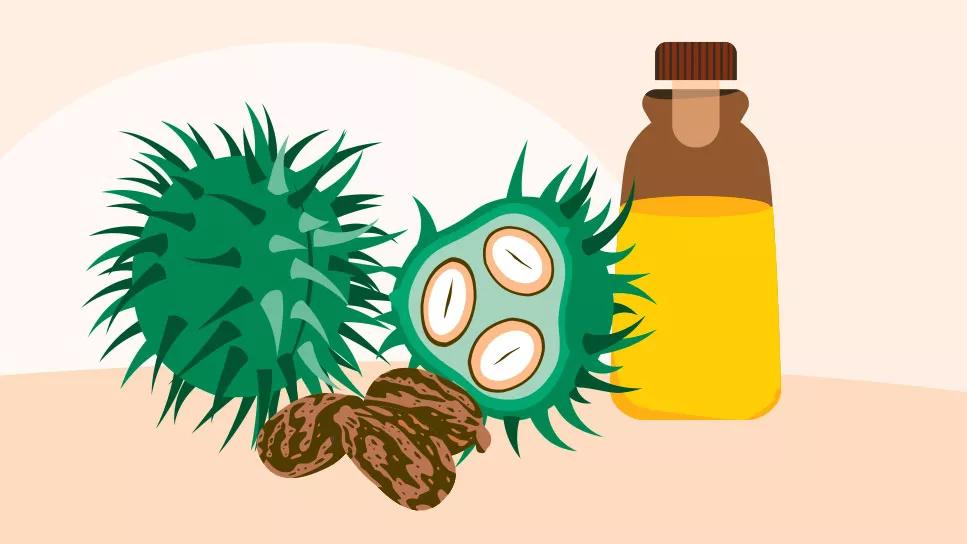The oil some TikTokkers swear by can actually cause stomach and eye issues, as well as skin rashes

What’s used in everything from motor fuel and high-gloss paint to body soap and skin care products?
Advertisement
Cleveland Clinic is a non-profit academic medical center. Advertising on our site helps support our mission. We do not endorse non-Cleveland Clinic products or services. Policy
It’s castor oil, an odorless, yellowish substance that comes from the seeds of the flowering castor bean plant (aka Ricinus communis).
Though it’s technically a vegetable oil, you won’t find castor oil in the aisles of your grocery store alongside other cooking oils. Food-grade castor oil does sometimes appear as an additive or flavoring, like in some candies and chocolates, but for the most part, it’s not considered an edible oil.
These days, TikTokkers are making inaccurate and even dangerous claims about castor oil, saying it can bring everything from shiny hair to better eyesight. Some people even claim that applying castor oil to your stomach can improve your gut health.
But don’t believe everything you see on social media, especially when it comes to so-called health and wellness tips. Family medicine physician Kevin Hopkins, MD, walks us through some of the claims about castor oil and what you should try instead.
Let’s get this out of the way up front: Despite the internet’s insistence, Dr. Hopkins says there’s really no need to use castor oil, period.
“I’ll be honest: In all my years of practice, I’ve never recommended it to anyone,” he says.
He debunks the many myths that suddenly surround castor oil.
Advertisement
The U.S. Food and Drug Administration (FDA) has approved castor oil as a natural laxative for relief from temporary constipation, making it the oil’s only legitimate health-related use. Castor oil contains ricinoleic acid, which attaches to your intestines and causes muscle contractions that help you poop.
But not so fast. Short-term castor oil use can cause intense diarrhea, while overusing it can actually lead to chronic (long-term) constipation. In fact, castor oil has fallen out of popularity as a laxative because there are so many options that are more effective and have fewer side effects.
What to try instead: “Physicians haven’t really recommended castor oil for constipation for over 50 years,” Dr. Hopkins says, “because there are much better options.”
If you’re having a one-time bout of constipation, you’re better off drinking lots of water, exercising and eating high-fiber foods. If you do need a laxative, he recommends trying an over-the-counter option that contains senna or polyethylene glycol.
“If you’re chronically constipated,” he cautions, “it’s time to talk to a healthcare professional rather than turning to home remedies.”
Historically, castor oil was used as a natural way to help stimulate labor. As recently as 2018, a study of more than 300 pregnant women who took a “castor oil cocktail” (usually a few tablespoons of oil mixed with juice) found that 91% gave birth vaginally with little to no complications.
But that doesn’t mean it’s risk-free. Castor oil is known to cause an upset stomach and diarrhea, which aren’t problems you want to have when you’re giving birth. And on a more serious level, castor oil is associated with rapid contractions and decreased blood flow to the baby.
“You should never take castor oil for labor without your healthcare provider’s support and guidance,” Dr. Hopkins warns.
What to try instead: There are no guaranteed ways to naturally induce labor. Nipple stimulation, a natural way to increase oxytocin levels, is the only method with data to back it up — but your best bet is to wait for baby to debut on their own timeline.
Some people claim that applying pure castor oil to their hair can make it look shinier and grow faster, but there’s no evidence of this.
“It’s true that castor oil is an ingredient in some conditioners and other hair products,” Dr. Hopkins concedes, “but there is no data to show that applying pure castor oil to your hair promotes growth.”
But it can lead to clogged pores, scalp acne and otherwise irritated skin. In rare cases, applying castor oil to your hair can even lead to a scalp disorder called acute hair felting — when your hair becomes so hard, tangled and matted that it has to be cut off or shaved.
Advertisement
What to try instead: There are plenty of claims about how to make your hair grow faster, but unfortunately, most of them just aren’t true. One that may be worth trying is rosemary oil, which has been scientifically shown to encourage hair regrowth. For the most part, though, the only true growth serum is patience (and proper hair care, which keeps your locks healthy).
And sometimes, you need a healthcare provider’s help. “If you’re experiencing significant hair loss or thinning, see your doctor to rule out illnesses or nutrient deficiencies,” Dr. Hopkins advises.
Ricinoleic acid, the main ingredient in castor oil, is a monounsaturated fatty acid that can help lock moisturize into your skin. It’s an ingredient in some moisturizers, cosmetics and deodorants.
But that doesn’t mean you should use pure castor oil on its own as a skin care product. “Applying pure castor oil to the skin can cause irritation and allergic reactions like contact dermatitis,” Dr. Hopkins says.
What to try instead: There are lots of natural options for achieving healthy skin. Forego the castor oil and learn what skin care ingredients are best for your skin type, then choose a moisturizer accordingly. Not sure? Ask your regular healthcare provider or make an appointment with a dermatologist, who can help you nail down the specifics.
Advertisement
Rumor has it that Cleopatra used castor oil to brighten the whites of her eyes, a claim that has fueled some people’s belief that castor oil can contribute to healthier eyes. Proponents claim that it can do everything from improve eyesight to cure glaucoma.
“None of these claims has any merit,” Dr. Hopkins states. “In fact, putting castor oil in your eyes can cause side effects like irritation, pain, blurred vision and even chemical burn-induced eye damage.”
What to try instead: If you’re experiencing eye problems, it’s important to see an eye care specialist who can help you identify the issue and preserve your vision. No home remedy, including castor oil, is going to do the trick.
Some social media users say they rub castor oil directly onto their stomach or into their belly button, while others apply a castor oil “pack” (aka a cloth soaked in castor oil) to their skin.
They claim it can relieve cramps, clear skin, aid digestion and generally detox the body. Some people have gone so far as to claim that using castor oil in these ways can help break up tumors in the body — a claim so ludicrous and false that the only response is “no way.”
“There is absolutely no scientific proof that these practices have any benefits whatsoever,” stresses Dr. Hopkins. “There’s just no catchall remedy that can ‘detox’ your body.”
Advertisement
What to try instead: This bears repeating: There’s no catchall remedy that can ‘detox’ your body. Your overall health is the result of a combination of factors and practices, like eating a balanced diet, exercising regularly, avoiding smoking and engaging in other healthy habits.
Skip the castor oil packs and turn to tried-and-true methods instead:
Finally, it should go without saying that there are no natural remedies that can shrink tumors. “You always need to consult with a healthcare provider to determine treatment for a tumor,” Dr. Hopkins states.
Remember what we said about castor oil not being considered an edible oil? That should tell you everything you need to know.
“Castor oil is known to cause severe intestinal cramping and diarrhea, which can also lead to dangerous dehydration,” Dr. Hopkins warns. “It shouldn’t be consumed without a healthcare provider’s guidance — and it’s not something most providers are going to recommend.”
For good measure, let’s run through some of the risks of using castor oil again:
There are other risks, too:
At the end of the day, nearly all of the claims about the health benefits of castor oil are either unproven or false.
“There’s just no need to use castor oil for anything related to your health and wellness,” Dr. Hopkins reiterates. “For every instance in which social media users claim you can use castor oil, there are other, scientifically proven methods that work better and are safer.”

Sign up for our Health Essentials emails for expert guidance on nutrition, fitness, sleep, skin care and more.
Learn more about our editorial process.
Advertisement

Olive oil is high in heart-friendly unsaturated fats

Your body needs some saturated fat, but too much can contribute to health issues

It’s best to avoid regular use of the ‘beef drippings,’ given high levels of saturated fat

These common cooking oils are often found in ultra-processed foods and can contribute to inflammation in your body

This healthy oil is packed with nutrients and great for roasting, drizzling and even baking

The popular cooking method can help you cut down on fat without losing the flavor and texture of your favorite foods

EVOO is full of antioxidants and has anti-inflammatory properties, both of which aid your body in multiple ways

This powerhouse oil fights fine lines and wrinkles, soothes sunburn and a whole lot more

Even small moments of time outdoors can help reduce stress, boost mood and restore a sense of calm

A correct prescription helps your eyes see clearly — but as natural changes occur, you may need stronger or different eyeglasses

Both are medical emergencies, but they are very distinct events with different causes